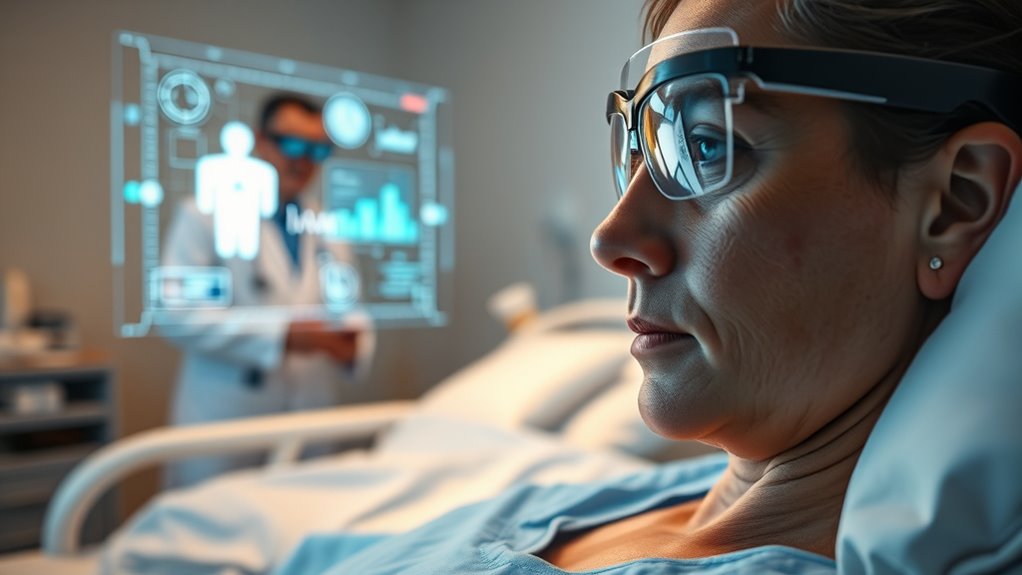AI is transforming healthcare by boosting diagnostic accuracy, personalizing treatment plans, and implementing predictive analytics. It quickly analyzes vast amounts of data, reducing human error and streamlining test results. Tailored therapies based on your genetic makeup and lifestyle lead to better outcomes with fewer side effects. Plus, AI’s predictive capabilities help catch health issues early, allowing for proactive care. The innovations in AI-driven solutions create a safer, more efficient healthcare experience for everyone. There’s more to explore on this topic!
Key Takeaways
- AI enhances diagnostic accuracy by quickly analyzing extensive medical data, leading to reliable and timely results that improve patient outcomes.
- Personalized treatment plans developed through AI consider individual genetics and lifestyle, increasing treatment success rates and minimizing side effects.
- Predictive analytics powered by AI allows for early identification of potential health issues, enabling proactive healthcare measures and reducing hospital visits.
- Continuous monitoring through AI-enabled wearable devices ensures real-time tracking of vital signs, allowing for prompt responses to health irregularities.
- Collaboration in AI-driven healthcare technologies fosters innovation, resulting in more effective patient care and the advancement of personalized, proactive healthcare models.

How can artificial intelligence revolutionize healthcare? The answer lies in its ability to enhance diagnostic accuracy and tailor treatments to individual needs. With advancements in AI, you’re witnessing a shift from traditional methods to a more efficient, data-driven approach in healthcare. Imagine walking into a clinic where robotic diagnostics quickly assess your condition, providing real-time insights that help doctors make informed decisions on your health.
Robotic diagnostics are transforming how diseases are detected and monitored. These systems analyze vast amounts of data, sifting through medical records, lab results, and imaging studies within seconds. You might wonder how this affects you personally. Well, if you’ve ever faced long waits for test results or struggled to understand complex medical jargon, AI is set to change that. By streamlining the diagnostic process, robotic systems minimize human error and deliver precise results, ensuring you receive timely interventions when necessary.
Robotic diagnostics revolutionize disease detection, cutting wait times and ensuring precise results for timely interventions.
But it doesn’t stop there. Personalized treatments are becoming a reality, thanks to AI’s analytical capabilities. Instead of a one-size-fits-all approach, healthcare providers can now consider your unique genetic makeup, lifestyle choices, and medical history. Imagine a doctor prescribing a treatment plan specifically designed for you, rather than relying on generic protocols. This level of customization increases the likelihood of successful outcomes and minimizes potential side effects, enhancing your overall experience.
AI doesn’t only assist in diagnosis and treatment; it also offers predictive analytics. By analyzing patterns in your health data, AI can forecast potential health issues before they arise. This proactive approach means you and your healthcare provider can work together to implement preventive measures, ultimately improving your long-term health and reducing hospital visits.
Furthermore, the integration of AI into healthcare systems enables continuous monitoring. Wearable devices powered by AI can track your vital signs, alerting you and your healthcare team to any irregularities. This constant vigilance fosters a sense of security, knowing that your health is being monitored even when you’re not in a clinical setting. Additionally, the growing trend of AI collaboration in projects is enhancing the development of new healthcare technologies, leading to innovative solutions for patient care.
Frequently Asked Questions
How Does AI Ensure Patient Data Privacy in Healthcare?
AI guarantees patient data privacy in healthcare through robust data encryption and strict privacy policies. When you use AI systems, they encrypt sensitive information, making it unreadable to unauthorized users. Additionally, these systems adhere to privacy policies that outline how data is collected, stored, and shared, ensuring compliance with regulations. By actively monitoring access and usage, AI helps protect your data, giving you confidence that your personal information remains secure and private.
What Are the Costs Associated With Implementing AI in Hospitals?
Implementing AI in hospitals can cost upwards of $1.5 million annually, according to a recent cost analysis. You’ll need to contemplate infrastructure investment, as upgrading technology and training staff incurs significant expenses. Additionally, ongoing maintenance and software updates can add to the overall budget. While these costs may seem high, the potential for improved patient outcomes and operational efficiency often justifies the initial financial commitment.
How Can AI Assist in Mental Health Treatment?
AI can greatly assist in mental health treatment by offering AI therapy and digital diagnostics. It provides personalized support, helping you track mood patterns and symptoms more effectively. With real-time data analysis, AI identifies potential issues early, allowing for timely interventions. You can access therapy sessions anytime, making mental health care more convenient. This technology not only enhances your treatment experience but also empowers you to take control of your mental well-being.
What Are the Ethical Concerns Surrounding AI in Healthcare?
Imagine a compass that sometimes points the wrong way—this symbolizes the ethical concerns surrounding AI in healthcare. You’ve got AI bias, which can skew treatment decisions, and it’s essential to guarantee informed consent, so patients understand how their data’s used. These issues can erode trust in the system, impacting both care and outcomes. As you navigate this landscape, it’s critical to advocate for transparency and fairness in AI applications.
How Does AI Impact Healthcare Job Opportunities?
AI impacts healthcare job opportunities by shifting the focus of the workforce. You’ll see job automation taking over repetitive tasks, which can lead to job displacement for some roles. However, it also creates new opportunities in tech development, data analysis, and AI management. As the industry evolves, you’ll need to adapt and acquire new skills to thrive in this changing landscape, ensuring that you remain valuable in the AI-driven workforce.
Conclusion
In conclusion, AI’s impact on healthcare is nothing short of revolutionary. Imagine a world where an AI system analyzes medical images and detects early signs of cancer that even seasoned radiologists might miss. This isn’t just a dream; it’s happening now. By harnessing the power of artificial intelligence, we’re not only improving diagnostic accuracy but also saving lives. Embracing AI in healthcare isn’t just smart; it’s essential for a healthier future.










